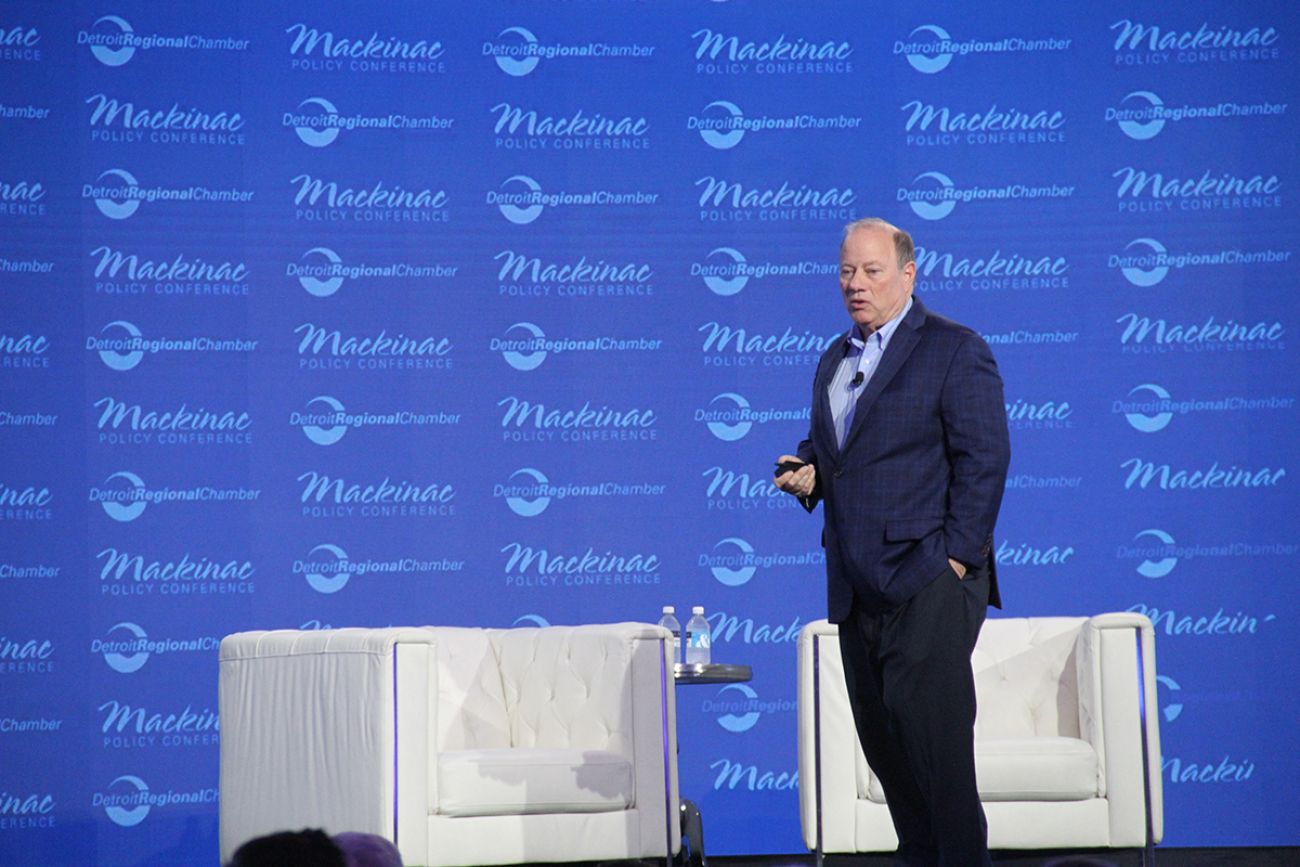Duggan urges state Legislature to fix Detroit’s ‘unfair’ tax system

The vast majority of Detroit homeowners could save 30% on their property tax bills under a proposal Mayor Mike Duggan advocated for at the Mackinac Policy Conference.
Duggan used his keynote address Wednesday to urge the Michigan Legislature to change state law so cities can opt-into a land value tax system. The move would allow Detroit to triple the tax rate on open land while slashing taxes on homes and structures. City officials who talked with BridgeDetroit said the proposal would be an automatic universal tax cut for homeowners while encouraging development by penalizing speculators who hold back growth in neighborhoods.
The 45-minute presentation was dense, but Duggan said it boils down to a simple idea: The current tax system rewards blight and penalizes development. Instead, the mayor wants to cut taxes for homeowners and raise taxes for owners of vacant land.
Related:
- Turning Ann Arbor into Austin and other tech recommendations for Michigan
- Michigan college enrollment decline among worst in the nation
- Democrats’ push to cut inmate sentences draws fierce pushback in Michigan
“We put the city on the wrong track with a bad tax system,” Duggan told reporters after his speech. “I’m looking to put the city on a future path through good taxes.”
Under the proposal, up to 97% of Detroit homeowners could expect to see a property tax cut, along with 70% of small businesses. Taxes on the median vacant lot would increase by 185%. The average tax bill for a vacant lot in Detroit is $30 per year, Duggan said. It would increase to $85 under his plan.
Duggan said residents who own a home with a taxable value of $50,000 would save $460 per year, while a $100,000 home would see taxes drop by $900. The proposal could cause Detroit to lose 10% of its tax revenue, but Duggan said that would be “dwarfed by the growth” in the long run.
Homeowners who own side lots would have lower tax bills overall, despite the tax increase on land, the mayor said. Duggan said his team is taking six weeks to study the impact on urban farmers and warehouse owners before legislation is introduced.
Reducing the tax burden will let Detroiters keep more of their money, which can have a major impact on household budgets when the median income is $36,140. Aaron Seybert, managing director of the Social Investment Practice at The Kresge Foundation, said the reform would address structural inequity baked into Detroit’s high property tax rates.
“It could be the single-largest anti-poverty effort that we’ve had in living memory,” Seybert said. “I like all the real estate incentives, I like disincentivizing speculation; I think all of that matters. Detroit is a real estate obsessed place, but people live in those buildings. The impact on their lives is the most compelling thing to me.”
Michigan House Speaker Joe Tate, D-Detroit, said top priorities for House Democrats include continued work "around targeted tax relief,” specifically the idea of a land value tax. Tate said the property tax burden is “significant and real to Detroiters."
"I'm supportive of the concept," Tate told Bridge. "We'll be assessing it as we go along, but that's something that we look at … what it's done for other areas of the country or other municipalities. It's an option that should be on the table."
Duggan hopes state lawmakers will pass legislation this fall, allowing Detroit voters to weigh in on a ballot proposal in February 2024. Implementation could come by summer 2025, Duggan said, and would be phased in over three years.
The mayor said “most of the City Council indicated to me they want to sponsor this” because they are troubled by the massive amount of taxpayer subsidies sought by developers to finance their projects.
“They’d love not to be voting on these big abatements,” Duggan said. “Every city has some abatements, but nobody has the kind we have.”
Excess costs of taxation
Nick Allen, a doctoral candidate at the Massachusetts Institute of Technology, has been advising city officials after co-authoring a 2022 study that found a land value tax would reduce tax bills for homeowners and accelerate the development of long-vacant properties.
“If you have an underutilized site downtown, that's going to see a significant tax increase,” Allen said. “That will also have an effect on the price of land downtown. One of the positive things that could happen is the stuck-ness of the land market could really change. It means people can’t sit on things forever.”
There are 30,000 vacant lots in the city. Duggan called the land “cheap lottery tickets” that owners hold on to in hopes of a payday from large developers who seek to buy the sites for their projects.
Duggan said speculators and owners of vacant commercial and industrial buildings are “screwing over” Detroit. He said the city has 452 scrap yards because it’s cheaper to buy and keep the land undeveloped compared to suburban communities. It’s a similar story for parking lots, which make up nearly a third of downtown Detroit.
“Downtown parking lot owners are going to be hit hard,” Duggan said.
Allen said the tax reform could also encourage homeowners to invest in their properties. Tax breaks would have the biggest impact on neighborhoods left out of tax incentives offered to developers, he said.
“The neighborhoods in the current tax system are the ones who are bearing the excess costs of taxation,” Allen said. “In downtown we have a fix with tax abatements, brownfield incentives and there is no corresponding fix for excess neighborhoods. Neighborhoods face substantial barriers to capital investment right now, that’s where taxes are going to come down the most.”
Bringing equity to Detroit’s unfair tax system is one of the first benefits cited by supporters who spoke to BridgeDetroit on Mackinac Island.
“If you’re a Detroit homeowner and you’ve been here for a long time your taxes are extremely high compared to the person who has a vacant lot next to you,” Seybert said. “You are already suffering from a very unfair system … It’s just a fairness issue. That’s money in your pocket immediately, but it also means your home is now more financeable. The mortgage market will benefit dramatically.”
David Blaszkiewicz, CEO of Invest Detroit, a nonprofit lender and investor, said a land value tax reduces the barriers for residents who can’t access other kinds of tax breaks that rely on relationships with government officials.
“You don’t have to apply, you don’t have to know somebody, you don’t have to have the process figured out within city government,” Blaszkiewicz said. “This just happens by right. It will immediately increase their land value. Think about the cost of homeownership and things like your mortgage and taxes are all part of what it takes to own a home. When you reduce the cost, the value of those homes go up.”
Blaszkiewicz said the tax reform would also reduce costs for developers who are looking to finance their projects in a city where property taxes are among the highest in the nation. Developers, especially in downtown Detroit, have largely relied on tax breaks to make their projects feasible.
“One of the intentions is to lift value and get the market to take back over,” Blaszkiewicz said. “We cannot provide perpetual subsidies and we’ve gotten ourselves into this perpetual subsidy game.”
Blaszkiewicz said Detroit needs to make it more “painful” for speculators to sit on undeveloped land.
“All you need to do to see the result of bad public policy is look at how many parking lots we have in downtown Detroit; look at how much vacant land we have in some areas of the city,” he said.
Tax reform could also have implications for Detroit’s population slide, as the U.S. Census Bureau reports the city lost 7,791 residents from 2021 to 2022. The census recorded Detroit’s population at 620,373. Housing affordability and high tax rates are a major reason researchers believe Detroiters are packing their bags for the suburbs.
“As people leave, especially in neighborhoods that see significant disinvestment, the people who stay are forced to carry those costs for the long run,” Allen said. “There's a fixed amount of money that it takes to run a city and there are fewer people paying it. The burden of that falls on people who choose to say or don’t have the opportunity to (leave). I think of this as a plan to deal with the core inequity of that problem as directly as we can.”
Housing advocates, developers and Detroit community members expressed support for the proposal. Roderick Hardamon, CEO of Urge Development Group, said the tax plan creates incentives for homeowners and would be a “great step forward” to reduce blight and grow neighborhoods. Hardamon said residents can use their savings to make home repairs.
Charity Dean, president of the Metro Detroit Black Business Alliance, said the reform would address a wealth gap impacting Black small businesses owners and homeowners.
“We don't have a sit-down restaurant on Grand River Avenue. There are so many things that we don't have because these vacant commercial buildings have been there,” Dean said. “Now the opportunity to do real development in neighborhoods is a possibility.”
Legislation hasn’t been drafted yet, but it would likely affect the state as a whole, allowing local governments to opt into a land value tax at their discretion. Tate said conversations about "potential language" in the legislation remain in the planning stage, but he's optimistic for movement once bills are drafted.
"We shouldn't be forcing it on a local unit of government, but as an option, I think it's something that if those residents want to see it happen, I think there should be an opportunity,” Tate said. "It is something that we can and we will definitely take a strong look at and see if we can move that along."
If passed by the Legislature, Detroit voters would have to opt in.
“Lots of conversations have started, but (this is) where the rubber meets the road,” Blaszkiewicz said. “These next few days, I think we'll get a much clearer understanding of where people's heads are at. I do think that we will be victorious with the state legislative process. Once we get past that, it's hard to imagine where the residents of the City of Detroit would not vote themselves in a tax break with no penalty.”
Bridge Michigan Reporter Jonathan Oosting contributed to this report.
See what new members are saying about why they donated to Bridge Michigan:
- “In order for this information to be accurate and unbiased it must be underwritten by its readers, not by special interests.” - Larry S.
- “Not many other media sources report on the topics Bridge does.” - Susan B.
- “Your journalism is outstanding and rare these days.” - Mark S.
If you want to ensure the future of nonpartisan, nonprofit Michigan journalism, please become a member today. You, too, will be asked why you donated and maybe we'll feature your quote next time!




